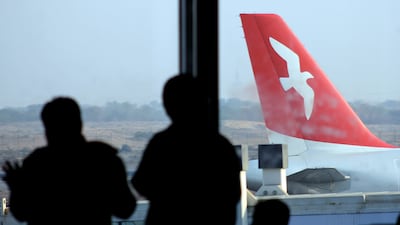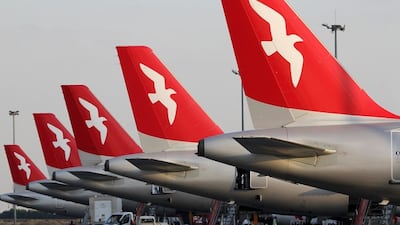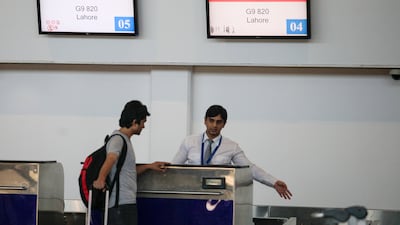UAE budget airline Air Arabia is optimistic about growth across its seven hubs, with “healthy” forward bookings in the fourth quarter and an expected boost from the opening of Abu Dhabi's new airport terminal next week.
The trend of “revenge travel” that was prevalent after the Covid-19 pandemic is easing but passenger demand has held up and is expected to extend into the coming months, the airline's group chief executive, Adel Ali, said in an interview.
Leisure travel is set to grow at an annual rate of 4 per cent to 7 per cent in terms of passenger numbers, although corporate trips will lag behind as companies opt to conduct some of their business by video conference, he told The National.
“November is a busy events season and forward bookings are looking reasonably well and healthy,” Mr Ali said.
“Hopefully the geopolitical [tensions] will not extend further and will be contained and will not impact business … so far, people are travelling.”
Air Arabia operates hubs in Sharjah, Ras Al Khaimah, Abu Dhabi, Morocco, Egypt, Armenia and Pakistan.

Air Arabia Abu Dhabi, the low-cost joint venture with Etihad Airways, is expected to benefit from the opening of Abu Dhabi International Airport's new Terminal A on November 1.
“Opening a modern new airport makes the customer experience much more happier, smoother and easier. So definitely, we are very excited for the opening of the [new terminal at the] airport and shifting of the airline,” Mr Ali said.
“It is hard work for everyone involved in Abu Dhabi aviation to shift an airport or an airline, but it's worth it because you end up with a much better facility … For us, we see the tourism infrastructure that has been put into place in Abu Dhabi over the last few years as a great opportunity for the airline to grow.
“The demand keeps increasing and more people want to visit. Abu Dhabi as a tourist city is becoming more value for money. We think the new hub in Abu Dhabi should be a source of continuous organic growth for us.”
Air Arabia is marking 20 years of service since it began operations in October 2003, becoming the first budget airline in the Middle East.
The milestone coincides with the long-awaited opening to the public of Terminal A in Abu Dhabi on November 1.
Airlines will move to the new Terminal A building in three phases over a two-week period from November 1 to November 14.
Air Arabia Abu Dhabi will shift its operations on November 14, along with 10 other airlines.
From November 15, all flights will operate solely from the new terminal.
Business across Air Arabia's other hubs continues to be brisk, Mr Ali said.
Fly Jinnah, a joint venture between Air Arabia and Pakistani conglomerate Lakson Group, is expected to begin international operations by the end of 2023 or the beginning of 2024, Mr Ali said.
Its domestic flights are “doing very well”, with load factors exceeding 90 per cent.

Air Arabia Maroc, which is based in Casablanca, is “doing good”, particularly, as Morocco hosted the annual meetings of the World Bank and International Monetary Fund earlier this month.
Performance at its hub in Borg Al Arab International Airport in Alexandria, Egypt, is also “very good” amid demand from tourists and Egyptian expatriates.
Plans for Air Arabia Sudan, its joint venture with Sudanese conglomerate Dal Group, have been temporarily shelved amid the war in the country but will be reviewed once fighting ends, Mr Ali said.
Air Arabia is getting “a lot of interest” from cities and businesses looking to set up a joint venture airline.
“Opportunities tend to knock on our door and we evaluate these,” Mr Ali said. “But what we’re busy with now is growing our existing hubs … Our hands are full and we haven’t looked beyond that.”
Airbus plane deliveries in 2025
To cope with the group-wide growth, the airline has signed an agreement to lease eight planes that will be added to its fleet in 2024, all of which will be delivered before the summer of next year, he said.
It leased a total of 23 jets in 2022 and 2023.
Air Arabia currently has no plans to buy new aircraft, after its signed a $14 billion (Dh51 billion) firm order for 120 Airbus A320 family jets at the Dubai Airshow in 2019, Mr Ali said.
The delivery of those jets – including A320 Neos, A321 Neos and A321 XLRs – has now been delayed to the first quarter of 2025, from the fourth quarter of 2024, due to supply chain problems facing the global aviation industry, Mr Ali said.
The airline is scheduled to receive 20 planes each year from 2025 until 2030.
Jet engine selection
Air Arabia is also close to reaching a decision on an engine that will power these single-aisle planes, Mr Ali said, declining to provide a time frame.
The airline is continuing discussions with General Electric's CFM venture and Pratt & Whitney, the rival providers for the Airbus A320 Neo, for the engine order.
The carrier has been “slow in deciding” because of the production issues facing engine makers, he said.
The new jets will offer a reduction on fuel burn of about 12 per cent, a key part of its sustainability efforts.
Sustainable aviation fuel (SAF) is widely considered to be the most significant contributor to helping the airline industry reach its goal of net-zero by 2050, but supplies are limited, making it more expensive than kerosene.
“SAF means increasing ticket prices by five times more to break even, so it's not a practical solution,” Mr Ali said.
Asked about the impact of oil price volatility, as the Israel-Gaza war stokes fears of an escalation in the oil-producing region, Mr Ali said the airline was continuing with its oil-hedging policy.
Pioneering low-cost travel 20 years ago

Air Arabia launched its inaugural flight from Sharjah to Bahrain in October 28, 2003, when Mr Ali first introduced the concept of low-cost travel to the region 20 years ago.
The airline, which was established on February 3, 2003 by royal decree, began operations with two Airbus A320s, flying short-haul trips to Bahrain, Kuwait, Lebanon, Oman and Syria.
The idea was to democratise air travel and make travel accessible to people of all socioeconomic backgrounds.
group chief executive of Air Arabia
“It has been a fantastic journey,” said Mr Ali, reflecting on the 20-year experience. “The most significant part is revolutionising air travel in the region, enabling people who weren't able to travel by air before to get on a plane.”
Introducing the idea of budget travel was not easy at the outset as people had stereotypes, such as uncomfortable seats or old aircraft, which required changing this mindset, he said.
“Low-cost carriers 20 years ago was a bad thing to have. The public knew very little about it … we had to educate the public about this business model,” Mr Ali said.
“For us, we find success is the number of people that never got on [a] plane and now it’s a normal part of their lives. That was our aim and objective.”
The airline became profitable in its first year of operations.
Since then, Air Arabia – the UAE's only listed carrier – has increased the size of its fleet to 71 aircraft and grown its network to more than 190 destinations. It carried 13 million passengers in 2022.
“Air Arabia has been the trailblazer for low-cost carriers [LCCs] in the Gulf region. It has not only proved that there is consumer demand for low-cost services but that it can be met profitably,” John Strickland, an aviation consultant with JLS Consulting, told The National.
The airline is expected to continue being profitable as travellers look for better deals amid inflationary pressures on consumer spending, according to analysts.
“When economic times are tough, people look for more economic pricing and this is offered by LCCs like Air Arabia,” Mr Strickland said.
The airline's second-quarter profit rose to a record Dh459 million ($124.96 million), up from Dh160 million in the same period last year, it said in August.
"As a first mover in the region, Air Arabia had played a pivotal role in shaping the low-cost aviation landscape," Linus Bauer, founder and managing director of Bauer Aviation Advisory, told The National.
“By offering competitive pricing, point-to-point services and minimal frills, it has set a precedent for other carriers,” he said.
“Furthermore, Air Arabia’s focus on secondary airports has helped decongest major hubs and spread out the economic benefits of aviation more evenly.”
The low-cost model recorded “substantial growth and acceptance” in the Middle East.
“The model has been particularly successful in catering to the price-sensitive segment of travellers, including expatriates working in the Gulf countries and tourists looking for budget-friendly travel options,” Mr Bauer said.
“The growth of LCCs has also been facilitated by the strategic geographical location of the Middle East, serving as a hub connecting East and West.”
Future of the low-cost carrier model
The future success of the LCC model will depend on several factors, including inflationary pressures and a slowing global economy facing mounting uncertainties.
“Rising fuel costs and inflation will potentially impact consumer spending and force LCCs to increase their fares. However, the inherent cost efficiency of the LCC model helps in mitigating some of these pressures,” Mr Bauer said.
“A global economic slowdown and uncertainty could result in reduced travel demand. LCCs could potentially be more resilient due to their lower cost structures and focus on short to medium-haul routes.”
Budget airlines in the region include Flydubai, Wizz Air Abu Dhabi, Kuwait's Jazeera Airways, Saudi Arabia's Flynas and Flyadeal.
Air Arabia can continue to capitalise on the UAE's growth as a global travel and tourism hub, tap into Africa's emerging travel market through its Egypt and Morocco hubs and seize growth opportunities in the underserved markets of its Pakistan and Armenia hubs, Mr Bauer said.
“Ongoing geopolitical tensions in the Middle East and beyond, competition and regulatory changes will continue to pose challenges, but also present opportunities for strategic partnerships and expansion,” he said.
“Air Arabia’s proven track record, strategic hub locations and efficient operations place it in a strong position to navigate these challenges and continue to thrive in the low-cost carrier segment.”
Airlines are affected by oil price fluctuations, currency swings, extreme weather, conflicts and supply chain bottlenecks.
They are also recovering from coronavirus-induced border closures that forced airlines to ground their fleets, driving the industry to the brink of collapse.
Mr Ali said it had “been hard, as this industry is, but every moment of it has been enjoyable and satisfactory”.
Reflecting on his personal journey with the airline for two decades, Mr Ali said: “We've had challenges but I'm very satisfied 20 years later to sit here and say 'it has been good'.”




















